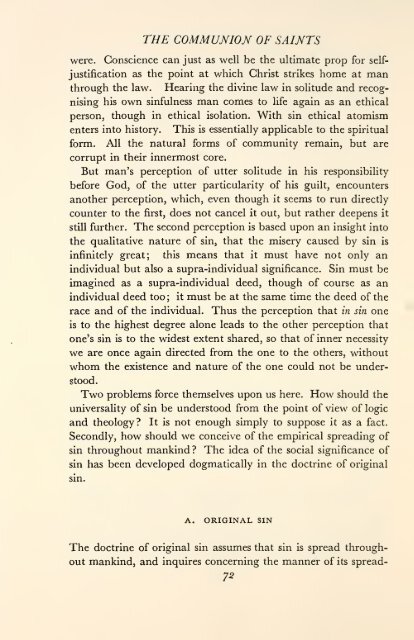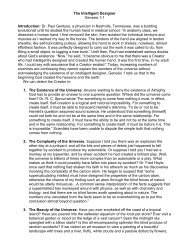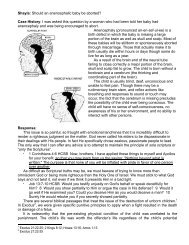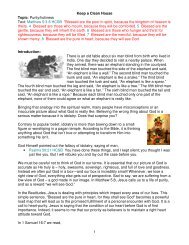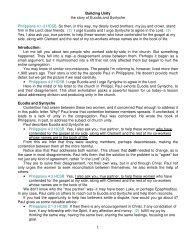Communion of saints
Communion of saints
Communion of saints
You also want an ePaper? Increase the reach of your titles
YUMPU automatically turns print PDFs into web optimized ePapers that Google loves.
were.<br />
THE COMMUNION OF SAINTS<br />
Conscience can just as well be the ultimate prop for selfjustification<br />
as the point at which Christ strikes home at man<br />
Hearing the divine law in solitude and recog-<br />
through the law.<br />
nising his own sinfulness man comes to life again as an ethical<br />
person, though in ethical isolation. With sin ethical atomism<br />
enters into history.<br />
This is essentially applicable to the spiritual<br />
form. All the natural forms <strong>of</strong> community remain, but are<br />
corrupt in their innermost core.<br />
But man's perception <strong>of</strong> utter solitude in his responsibility<br />
before God, <strong>of</strong> the utter particularity <strong>of</strong> his guilt, encounters<br />
another perception, which, even though it seems to run directly<br />
counter to the first, does not cancel it out, but rather deepens it<br />
still further. The second perception is based upon an insight into<br />
the qualitative nature <strong>of</strong> sin, that the misery caused by sin is<br />
infinitely great; this means that it must have not only an<br />
individual but also a supra-individual significance. Sin must be<br />
imagined as a supra-individual deed, though <strong>of</strong> course as an<br />
individual deed too ; it must be at the same time the deed <strong>of</strong> the<br />
race and <strong>of</strong> the individual. Thus the perception that in sin one<br />
is<br />
to the highest degree alone leads to the other perception that<br />
one's sin is to the widest extent shared, so that <strong>of</strong> inner necessity<br />
we are once again directed from the one to the others, without<br />
whom the existence and nature <strong>of</strong> the one could not be understood.<br />
Two problems force themselves upon us here.<br />
How should the<br />
universality <strong>of</strong> sin be understood from the point <strong>of</strong> view <strong>of</strong> logic<br />
and theology It is not enough simply to suppose it as a fact.<br />
Secondly, how should we conceive <strong>of</strong> the empirical spreading <strong>of</strong><br />
sin throughout mankind The idea <strong>of</strong> the social significance <strong>of</strong><br />
sin has been developed dogmatically in the doctrine <strong>of</strong> original<br />
sin.<br />
A. ORIGINAL SIN<br />
The doctrine <strong>of</strong> original sin assumes that sin is spread throughout<br />
mankind, and inquires concerning the manner <strong>of</strong> its spread-<br />
72


